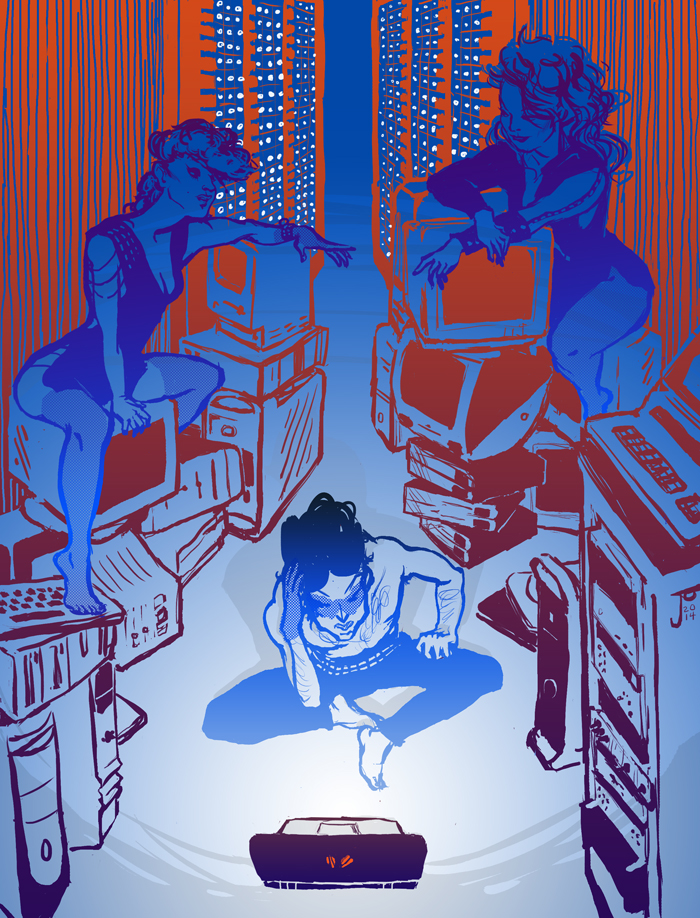Wednesday, June 25th, marks the 30th anniversary of the release of Prince and The Revolution’s Purple Rain. In honor of this, Deadshirt presents an entire week of art and essays that explore and celebrate one of the greatest albums of all time. Dig, if you will.
By Mike Duquette
Poor lonely computer
It’s time someone programmed U
It’s time U learned love and lust
They both have four letters
But they’re entirely different words
Poor lonely computer
Poor, poor lonely computer
Do U really know what love is?”
–unused lyric, “Computer Blue,” 1984
The Internet’s completely over.”
–Prince, The Daily Mirror, 2010
Nestled deep into the first side of Prince and The Revolution’s Purple Rain, “Computer Blue” serves its purpose in the film as a musical rough patch between The Kid and his muse, Apollonia. But in the greater context of Prince’s career as a professional solo musician, it’s perhaps the first great signifier of the often uneasy, frighteningly accurate ways Prince turns audiences on its head with frequent use (and abuse) of technology.
It’s uncertain why Prince–not known for any Parliament-Funkadelic-esque fascination with science fiction–would, at this point in his career, regard technology with enmity. From the release of debut album For You in 1978, Prince was destined to become intertwined with the cutting edge of tech for the rest of his days. Not yet out of his teens, Prince’s stunning proficiency on nearly every instrument imaginable meant his earliest records, from “Soft and Wet” to “I Wanna Be Your Lover” to “Controversy,” were multi-tracked opuses laid down with workmanlike precision by Prince alone.
By the release of 1999 in 1982, Prince had assembled a backing band ready to assist on tour and in studio (at the time consisting of guitarist Dez Dickerson, bassist Mark Brown, “Doctor” Matt Fink and Lisa Coleman on keyboards, and drummer Bobby Z; by Purple Rain, Dickerson would be replaced by Wendy Melvoin, crystallizing the official Revolution). But his works were still, as the album sleeves were quick to point out, “produced, written, performed and arranged” by Prince, taking electronic music to dazzling heights thanks to prolific use of the Oberheim OB-X synthesizer and the Linn LM-1 drum machine, crafting an ‘80s version of traditional funk and R&B soon known as the Minneapolis sound.
Much of the techno-anxiety of “Computer Blue” would be excised from the final master, which originally stretched to 12 minutes long and possessed lengthy monologues full of heavy techno-metaphors. (Those metaphors were mostly delivered by The Revolution’s power duo, Wendy and Lisa, whose hydro-bondage intro to the song still gets fans pretty hyped.) But those few verses (”Where is my love life? Where can it be? / There must be something wrong with the machinery”) dig in deep. Prince/The Kid channels his manic emotions—his hurt over Apollonia’s decision to pursue fame under the auspices of rival bandleader Morris Day, and his violent, near-psychotic reaction to the news—through a strong paranoia against the machines that runs colorfully at odds with his body of work to date.
Of particular impact is the song’s second half, a moody, mournful instrumental written by Prince’s father, John L. Nelson. (“Father’s Song,” as it is known, is heard in the preceding scene of the film, when The Kid approaches his abusive father who is playing a mournful version of the tune on piano.) Its place in the trippy “Computer Blue”—played cleanly on guitar by Prince, against a simple bass groove—is another organic rage against the machine of sorts, breaking up the staccato verse and chorus patterns with a burst of affecting creativity.
For many years after the release of Purple Rain, it seemed as though Prince had made his peace with technology. The 1990s saw The Artist make stunning leaps and bounds with the Internet as a means of music distribution, years before any of Shawn Fanning’s classmates at Northeastern mocked his ball cap-matted hairstyle. And then, as suddenly as he made an about-face with “Computer Blue,” he shuttered the download-only NPG Music Club in 2006, slapped fans with insane lawsuits, and generally seemed like his on-screen father, the bitter old husk of an artist he’d constructed as an adversary in Purple Rain.
Granted, the pendulum seems to be swinging back in the other direction: Prince’s latest project, the all-female backing band 3rdEyeGirl, has a strong presence online and on Twitter (with 140-character contributions from His Royal Badness himself), and he’s also taken to Instagram lately. There’s also the Earth-shattering announcement that he’d reached a global catalog agreement with estranged label Warner Bros., gaining ownership of his classic masters and licensing them back to Warner for an eventual reissue campaign, to kick off with an as-yet-unconfirmed 30th anniversary deluxe edition of Purple Rain this summer.
But maybe that skinny motherfucker with the high voice had a point after all. In an age where it’s easy to get caught up in the hoopla of communicating in 140 characters or a sharing a heavily-filtered picture (and easier still to let what you’re perceiving online get in the way of the truth and really burrow in your head), maybe Prince’s opinions of the Internet and technology don’t come from a bitter place, but a cautionary one. Then and now, there really might be something wrong with the machinery.
Jen Overstreet is an illustrator, multimedia artist, musician, and aspiring magical girl. See her work, selfies, and photos of food on Twitter and tumblr.
Mike Duquette is the Content Specialist for Legacy Recordings and the founder/editor of The Second Disc, a music site devoted to reissues, box sets and other repackaging of pop music.
Read more from 30 Purple Years, our tribute to Prince’s Purple Rain!

